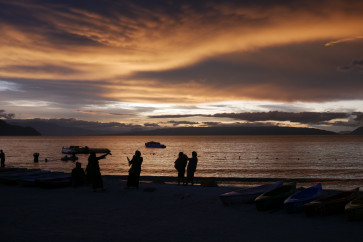Popular Reads
Top Results
Can't find what you're looking for?
View all search resultsPopular Reads
Top Results
Can't find what you're looking for?
View all search resultsNo way but down next year
JP/Ricky YudhistiraConsidering the confused state of our popular culture, not only is it difficult to look back and try to pick out a unifying theme that defined 2009, but it is an almost impossible undertaking to conjecture what will happen in the realm of popular culture in 2010
Change text size
Gift Premium Articles
to Anyone
J
span class="caption" style="width: 398px;">JP/Ricky Yudhistira
Considering the confused state of our popular culture, not only is it difficult to look back and try to pick out a unifying theme that defined 2009, but it is an almost impossible undertaking to conjecture what will happen in the realm of popular culture in 2010.
But a literal reading of German philosopher Walter Benjamin’s concept of history can be our guide to gauging the prospects and possibilities in 2010.
As Benjamin’s angel of history flies forward with the power of a storm blowing from paradise, he sees one single catastrophe that keeps the wreckage piling skyward as he flies to the future to which his back is turned.
The storm is what we call progress, or “creative destruction” in the words of Austrian economist Joseph Schumpeter.
But we are doomed. We’ve never really experienced serious creative destruction, and thus far the angel of progress has always eluded us.
The angel of history does fly, but he witnesses only the pile of garbage and refuse that comes from the industry of mediocrity and farce.
It is small wonder that year in and year out we deal with the same fake reality TV, TV-derived cinema and the bankable fizz of bubblegum pop.
If it ain’t broke, don’t fix it. If it sells a lot of soap and whitening cream, why take it off the air?
2010 will be no exception.
Throughout 2009, TV provided us with more than enough drama — and only drama at its most histrionic — with nothing to indicate that such drama will cease to feed off our claustrophobia in 2010.
As if the real world, and by real world I mean politics — which is also defined by 18-hour local TV news cycles — has not given us enough drama, reality TV has upped the ante by choreographing over-the-top family feuds and scuffles, or other domestic disturbances involving cell phones being hurled and street-side fistfights.
One reality show that was big in 2009 — and will unlikely be gone from the airwaves in 2010 — is that pertaining to another domestic issue, the trials and tribulations of matchmaking.
Given the monstrous success of this matchmaking show, the prospects are looking good for TV stations to carry programs depicting familial affairs.
Pretty soon reality TV will be teeming with faceless, nameless pretenders going after dead rich people’s wills, or a legion of forty-somethings competing against each other to work out their marital problems.
A little over a decade ago, in the face of a serious onslaught from Hollywood, no one expected that homegrown movies would once again rule the cinemas.
In recent years, the Indonesian film industry has achieved precisely that. In the past five years or so, we witnessed locally made films drawing in the biggest crowds, and it’s safe to say that two out of four movies being played in the cinema near you are produced locally.
Those days are numbered though.
If we can stop the army of vultures taking advantage of the revival of the local movie scene for their own (financial) benefit, we risk repeating the local movie industry’s past mistake of churning out bad movies that drove away even clueless movie fans.
You don’t need to go the theater to see a movie titled Ai Lop Yu Pul to know how deep the local movie industry is in its artistic quagmire. The local form for “I love you full”, itself a mangled English expression that has entered the local vernacular thanks to the late singer Mbah Surip, the film is so unsure of itself that it needs to borrow the line for its title.
It seems that in 2010, the ghost of Mbah Surip and all of the literal ghosts that haunt every turn of Jakarta’s streets will scare moviegoers away from local films in droves. Before long, the local movie scene could need a new revival.
The pop music scene has languished in its artistic doldrums for so long that it will probably take a heaven sent miracle to lift it out of its misery.
Anyone who has ever taken up basic guitar or piano lessons in the fifth grade will in no time see that something has gone terribly wrong in the local pop scene.
It’s as if Apollo, the god of music, has cast his curse on us by forcing us to listen to the infinite loop of music from hell. And hell is other people’s music delivered to us in the form of cell phone ringtones.
With so much bad music in 2009, which for unknown reasons manage to sell by the thousand, I suppose there is no way but down for the music scene in 2010.
We still have to put up with the same minor-key, air-brushed, brokenhearted lament that is Indonesian pop music.
Don’t say you haven’t been warned.
The author is a staff writer at The Jakarta Post.










